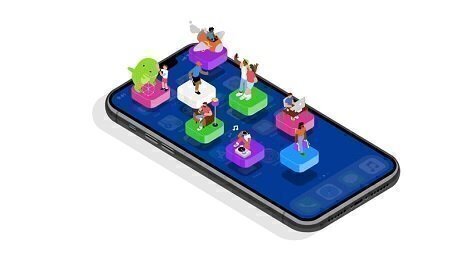Can Apple be held accountable if consumers think products in its App store are too expensive because Apple has a monopoly on selling iPhone apps?
 The Supreme Court considered that question today at public arguments about allowing a class-action lawsuit against Apple to proceed through the legal system.
The Supreme Court considered that question today at public arguments about allowing a class-action lawsuit against Apple to proceed through the legal system.
The question before the nine Justices on Monday wasn’t exactly straight-forward: “Whether consumers may sue anyone who delivers goods to them for anti-trust damages, even when they seek damages based on prices set by third parties who would be the immediate victims of the alleged offense.”
In 2011, Robert Pepper and three other people sued Apple, claiming that a 30 percent commission charged by Apple to developers to sell their apps to iPhone users was a monopolistic practice that made apps more expensive for consumers. Since then, Apple has argued that if anyone had the ability to sue Apple, it would be the developers, since they would be the theoretical first “victims” of overcharging.
A district court initially ruled in favor of Apple and its claim that a 1977 Supreme Court decision, Illinois Brick Co. v. Illinois, settled that question already. In Justice Byron White’s majority opinion then, the Court found that a third party who paid “pass-through costs” couldn’t effectively recover overcharges from a product (concrete bricks) it bought at the end of a distribution chain; instead, the first party to be overcharged had the right to recover damages.
The Ninth Circuit Appels Court overturned the district court ruling in favor of Pepper. The three-judge panel said Apple was the direct distributor of iPhones (and therefore, iPhone apps) and iPhone buyers had the right to sue under Illinois Brick, since they were first direct purchasers. The appeals court acknowledged its ruling conflicted with a similar case decided in the Eighth Circuit.
The Supreme Court accepted Apple’s appeal in June. The case has been widely watched for several reasons. Apple’s commission model is used by other major companies in the digital world. Also, there have been continuing questions about the applicability of brick-and-mortar commerce laws in the digital age, as well as the Supreme Court’s ability to interpret the latest technologies in context with its prior decisions.
According to early reports from today’s arguments, at least three Justices indicated they might support allowing the consumer lawsuit to move forward. Justices Samuel Alito and Neil Gorsuch questioned the 1977 Illinois Brick ruling, while Justice Elena Kagan said she thought the act of buying an app was a “one-step transaction with Apple.”
Two other Justices, Sonia Sotomayor and Brett Kavanaugh, also seemed to question the relevance of Illinois Brick in the iPhone age.
Scott Bomboy is the editor in chief of the National Constitution Center.







